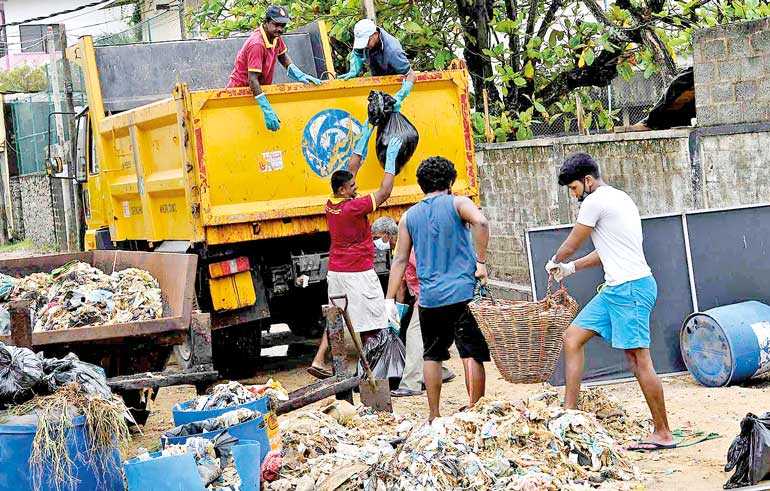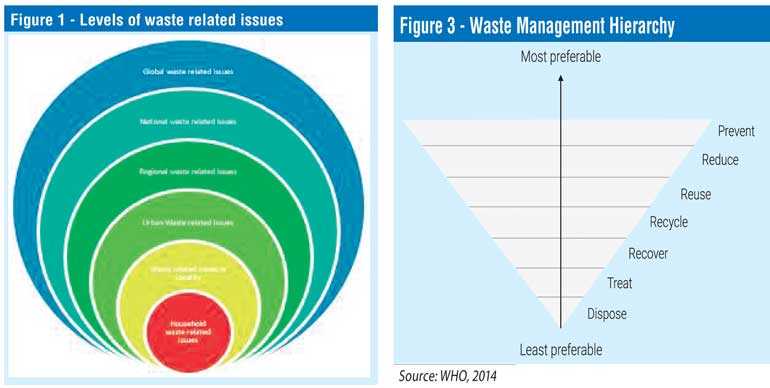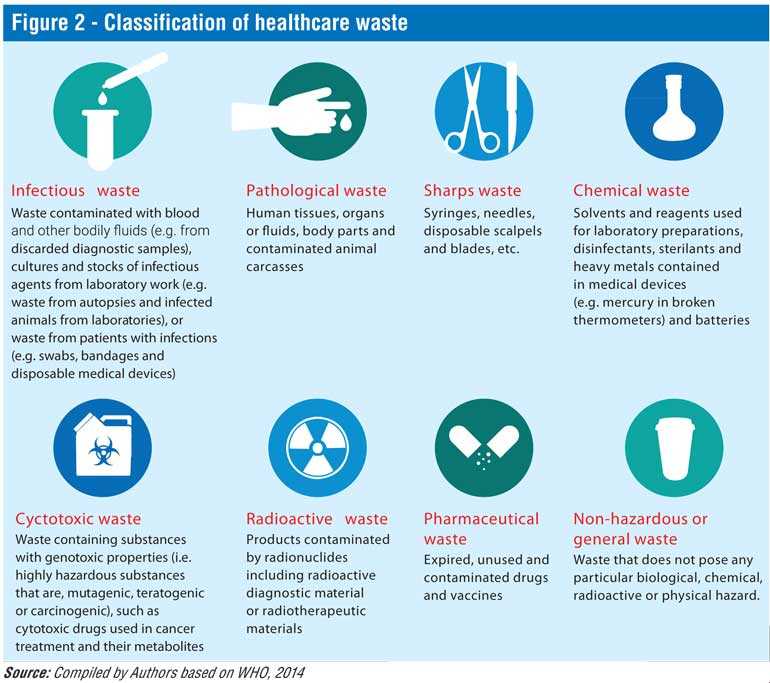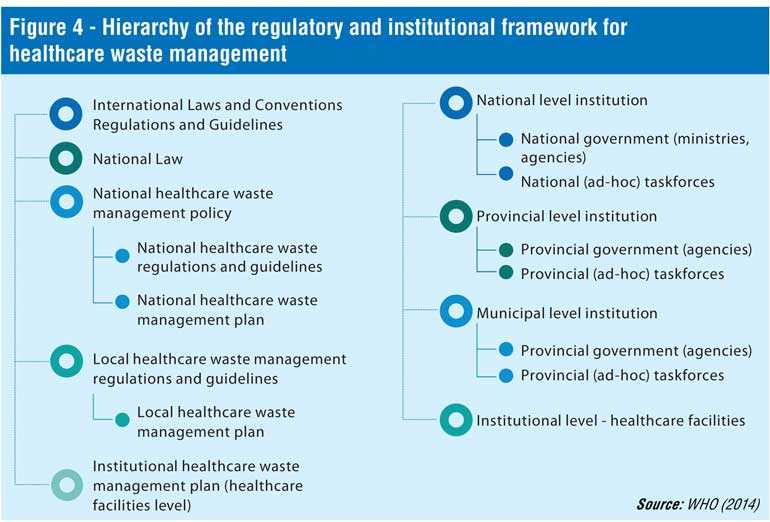Wednesday Feb 18, 2026
Wednesday Feb 18, 2026
Tuesday, 22 September 2020 01:43 - - {{hitsCtrl.values.hits}}

The local level waste management system requires specific precautions, operations, and management practices under the COVID-19 pandemic – Pic by Shehan Gunasekara
The corona pandemic creates additional challenges in waste management, especially in developing countries. Inadequate and inappropriate handling of healthcare waste may have a significant impact on the environment and serious public health consequences.
Healthcare waste management includes waste separation at source, handling at source, collection, transportation, recycling, and final disposal. Developing countries that may already lack proper healthcare and waste management practices due to technical, operational, and financial limitations particularly become more vulnerable during the pandemic, with its new risks and challenges, creating additional burdens for both local and national governments.
Waste and healthcare waste 
Waste originates from our minds first. Waste becomes hazards only due to social negligence and carelessness. Waste starts its journey from the demands of our societies and it spreads from a household to a global environment issue step by step as follows.
According to the WHO guideline reports (WHO, 2014; WHO, 2017), healthcare waste includes all the waste generated within healthcare facilities, research centres and laboratories related to medical procedures.
Issues regarding waste management during the pandemic
The waste collection services are disrupted due to shortage of workers because of the virus, lack of safety at their work, safe handling of household waste where citizens have fallen sick with the coronavirus, increased quantities of healthcare waste to handle, and lack of securing safe management of waste from collection points to recycling or treatment facilities. Thus, developing countries and cities while simultaneously fighting against COVID-19 against its spread, they are also challenged with preventing risks to the environment and human health including those of waste workers caused by COVID-19 related waste.

Waste management
The local level waste management system requires specific precautions, operations, and management practices under the COVID-19 pandemic. Thus, proper waste management of healthcare waste needs to be based on 3R principles (Reduce, Reuse, and Recycle). According to the waste management hierarchy, the better practice of healthcare waste management initially should aim to avoid or recover as much of the waste as possible, rather than disposing of it by burning or burial. Waste can use by recycling them or producing innovative creations as dressing materials, brooms, arts and crafts, etc.

Responsibility of waste management
Householders must make maximum effort to minimise their wastage. Households are advised to follow the instructions given by the local authority and public health officer. The households that live in the self-quarantine places with COVID-19 positive cases or people who are thought to be infected are guided to separate their waste into a minimum of three categories as Kitchen and food waste (organic waste), non-biodegradable waste, and healthcare waste. This makes the waste management process much easier.
Waste collection workers shall be supplied with an adequate amount of hand sanitisers and cleaning agents to wash their hands each time they pick up special waste from a quarantine place and special work wear such as overalls, masks, gloves, shoes/boots, and an apron or disposable work clothing must be given to them. They should be properly instructed, trained, and monitored. Collection crews should be instructed to minimise their contact with the external environment during the collection of special wastes, maintain social distance during their house to house collection activities., The special waste collection vehicle shall be disinfected at the final disposal site right after unloading the waste and all waste generated from quarantine centres shall be treated as infectious waste and waste management should be done separately and carefully.
Although the main focus on healthcare waste management goes to the decision-makers and practitioners in governments, and private sector, development agencies, academics, and think tanks that are involved in developing countries, for effective healthcare waste management, it requires cooperation and interaction at all levels. When considering the context of Sri Lanka, in March 2020 the Government of Sri Lanka formulated the ‘Interim guideline for the management of solid waste generated by households and places under self-quarantine due to Corona Pandemic’.
The interim guideline is prepared in line with the current solid waste management policy, regulation, and standards. Establishment of a national policy and a legal framework, training of personnel, raising public awareness by organising E-workshops, symposiums, seminars, and support for the local entrepreneurs to come with innovative ideas are essential elements of a successful healthcare waste management system. The young generation also should come forward with creative ideas and women too must be given priority in local, national, international level waste management programs to prove themselves and have the highest managerial potentialities from household to international.
On the other hand, industrial waste, was significantly reduced during the pandemic period, especially in developed countries. NASA has produced satellite images stating that due to the quarantine orders there was a positive reduction of air pollution than before. Hence, there are pros and cons, but anyhow countries should try to reduce their negative impact on environmental security.

Bibliography
Centre for Women and Environmental Security. (2020). Waste management during corona pandemic and its impact on environment. Online Dialogue
Institute for Global Environmental Strategies. (2020). Waste Management during the COVID-19 Pandemic. United Nations Environment Program
World Health Organization (WHO). (2014). Safe management of wastes from healthcare activities.WoldHealthOrganization.https://www.who.int/water_sanitation_health/publications/safe-management-ofwastes-from-healthcare-activities/en/r
World Health Organization (WHO). (2017). Safe management of wastes from healthcare facilities: A summary. https://apps.who.int/iris/bitstream/handle/10665/259491/WHO-
FWC-WSH-17.05-eng.pdf;jsessionid=91A3806F2AF2049CCD058A09A062C2EA?
sequence=1.
World Health Organisation (WHO) (2020); WHO announces COVID-19 outbreak a pandemic. https:// www.euro.who.int/en/health-topics/health-emergencies/ coronavirus-covid-19/news/news/2020/3/whoannounces-covid-19-outbreak-a-pandemic
(The writer is a Researcher Assistant at the Institute of National Security Studies Sri Lanka (INSSSL), premier think tank on National Security functioning under the aegis of Ministry of Defence. The opinion expressed is her own and not necessarily reflective of the institute.)